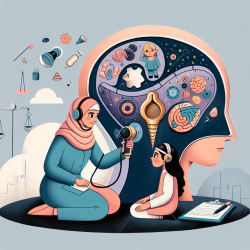As practitioners dedicated to improving the health outcomes of children and adolescents, it is crucial to stay informed about innovative approaches and evidence-based interventions. One such promising approach is the use of mobile phone technology to address various health issues among youth. A recent study titled "Mobile Phone Technology for Preventing HIV and Related Youth Health Problems, Sexual Health, Mental Health, and Substance Use Problems in Southwest Uganda (Youth Health SMS): Protocol for a Pilot Randomized Controlled Trial" provides valuable insights that can be implemented in our practices.
Overview of the Study
The study conducted in Southwest Uganda aims to evaluate the acceptability and feasibility of an SMS text message intervention called Kirabo. Kirabo is designed to provide adolescents with information on HIV prevention, mental health, and substance use, linking them to relevant health services. The intervention is grounded in the Information-Motivation-Behavior (IMB) model and utilizes the ADAPT-ITT framework for adaptation.
Key Findings and Implications
The study highlights several key findings that can be directly applied to our practice:
- Feasibility and Acceptability: The intervention demonstrated high feasibility and acceptability among adolescents, with 92% of participants accessing the platform at least once during the pretest phase.
- Behavioral Health Screening: The study used validated screening tools like the PHQ-9 for depression and GAD-7 for anxiety, which can be integrated into our own assessment protocols to identify at-risk youth.
- Linkage to Services: Kirabo successfully linked adolescents to local HIV clinics and mental health counselors, emphasizing the importance of providing clear and accessible referral pathways in our interventions.
- Tailored Messaging: The use of SMS text messages tailored to individual needs (e.g., HIV prevention, mental health support) proved effective, suggesting that personalized communication can enhance engagement and outcomes.
Practical Applications
Based on these findings, practitioners can enhance their interventions by incorporating mobile technology in the following ways:
- Adopt Mobile-Based Screening Tools: Integrate validated tools like PHQ-9 and GAD-7 into mobile platforms to facilitate early identification and intervention for mental health issues.
- Develop Tailored Messaging Systems: Create SMS-based systems that provide personalized health information and reminders to encourage positive health behaviors and adherence to treatment plans.
- Enhance Referral Networks: Establish clear referral pathways and partnerships with local health services to ensure seamless linkage to care for identified health issues.
- Engage in Continuous Evaluation: Regularly assess the feasibility and acceptability of mobile interventions through surveys and user feedback to make data-driven improvements.
Encouraging Further Research
While the study provides a solid foundation, further research is essential to explore the long-term impact of mobile interventions on youth health outcomes. Practitioners are encouraged to participate in or initiate research projects that examine the effectiveness of mobile health technologies in different contexts and populations.
To read the original research paper, please follow this link: Mobile Phone Technology for Preventing HIV and Related Youth Health Problems, Sexual Health, Mental Health, and Substance Use Problems in Southwest Uganda (Youth Health SMS): Protocol for a Pilot Randomized Controlled Trial.










